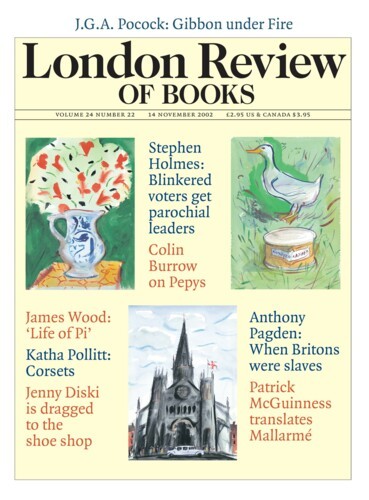One of the films showing at the London Film Festival later this month is The Quiet American, starring Michael Caine and Brendan Fraser, directed by Philip Noyce, and based on Graham Greene’s novel. (It isn’t the first time the book’s been adapted for the screen: Mankiewicz made a version in 1958 which Greene, who anyway tended to have a very low opinion of films based on his novels, couldn’t stand – he was particularly enraged by its anti-Communist distortions.) The narrator of Greene’s book – for those who’ve forgotten – is Thomas Fowler, a cynical, world-weary, middle-aged, opium-smoking English journalist in Saigon. (Caine has said: ‘I met Greene a couple of times and I’m kind of basing myself on him.’) The quiet American is Alden Pyle, a naive young Bostonian recently arrived in Indochina, ‘impregnably armoured by his good intentions and his ignorance’, who works for the US Economic Mission. He’s a follower of one York Harding, the author of books of political theory called things like The Advance of Red China, The Challenge to Democracy and The Role of the West, who believes that all Vietnam needs is a Third Force – the first two being colonials and Communists – to set it on its proper path. Fowler and Pyle don’t argue only about politics: they’re both in love with the same girl, Phuong. Nonetheless, they like each other.
Murray Sayle has called The Quiet American, which was published in 1955, ‘still the best book about America in Vietnam, and its miscalculations’. Noyce – an Australian, whose Hollywood movies include the Tom Clancy adaptations Patriot Games and Clear and Present Danger – wanted to make the film because, he says, rereading the novel a few years ago after meeting US Military Intelligence officers who’d been in Vietnam in 1945, he thought: ‘Wow, this answers the questions that these seventy and eighty-year-old men have been perplexed by all these years – Why? Why did this war happen?’ The movie’s closing sequence, congratulating Greene on his foresight, is a montage of Fowler’s newspaper reports chronicling the escalation of US involvement in Vietnam over the next two decades.
But the novel isn’t only about American foreign policy: it’s also concerned with ends and means and motives and varieties of guilt, and with European (or rather, English and to some extent French) perceptions of the United States. And it is in this respect that the film differs most interestingly from the book. Various changes have inevitably been made, the most significant of which is the necessary absence of a first-person narrative – perhaps the greatest loss in this translation of an exceptionally good novel into an unexceptionally good movie. (It’s the other way round with The Third Man: Greene’s attempt to tell the story from the perspective of Major Calloway, the character played in the film by Trevor Howard, is a major flaw in the written version.) Fowler provides a voiceover, and there’s the occasional point-of-view shot, but these effects are largely cosmetic: for most of the film, we’re looking at Michael Caine. And because the story is told on screen, rather than through Fowler’s voice, Fowler has to be an altogether more attractive character than he is in the book to win our sympathy; and Pyle, reciprocally, has to be more of a villain, less innocent – as, of course, he has to be anyway. If Fowler met Pyle today, fifty years on, he might have less faith in the basic goodness of his intentions.
There is an interesting comparison to be made with Lolita, which was published in the same year as The Quiet American. Nabokov was delightfully scathing of ‘an otherwise intelligent reader who . . . described Lolita as “Old Europe debauching young America”’. The notion, once he’s put you in mind of it, is nonetheless hard to shake off: Fowler’s Pyle and Humbert’s Lolita, America through the eyes of a condescending and infatuated Europe. To say that Pyle has grown up into George W. Bush would be a little too neat, and one of the lessons of The Quiet American is that anything that looks straightforward should be distrusted: this applies both to supplying renegade ‘Third Forces’ with powerful weapons and to reducing entire nations to graspable stereotypes. The last time they see each other, Pyle says to Fowler: ‘You talk like a European, Thomas. These people aren’t complicated.’ Fowler replies: ‘Is that what you’ve learned in a few months? You’ll be calling them childlike next.’ Pyle says: ‘Well – in a way.’ And Fowler tells him: ‘Find me an uncomplicated child, Pyle. When we are young we are a jungle of complications. We simplify as we get older.’
Send Letters To:
The Editor
London Review of Books,
28 Little Russell Street
London, WC1A 2HN
letters@lrb.co.uk
Please include name, address, and a telephone number.

